The best electric mountain bikes make ascents a lot easier, while providing all the performance and handling you want on the way back down. They add some extra power on the flat too.
You can turn your focus to climbing the steepest, most technical slopes you can find – or just go longer and faster with a grin from ear to ear. The ability to cover ground quickly means you can go out and explore places you wouldn’t otherwise consider.
Another reason why eMTBs are taking over is they enable you to ride in ways you otherwise couldn’t. As the anatomy of electric mountain bikes becomes more refined, their handling increasingly rivals – and in some cases exceeds – that of non-assisted mountain bikes.
For more on what to look for when buying an eMTB, read our buyer’s guide at the bottom of this article. Otherwise, check out our guide to the best electric bikes for advice on choosing the right ebike for you.
If your riding will not be exclusively off-road, the best electric gravel bikes are worth considering instead. Elsewhere, motor-assisted miles on tarmac call for the best electric road bikes.
To read more about electric mountain bikes, jump to our eMTB buyer's guide.
Editor's note: we updated our best electric mountain bikes list on 16 April 2025 to add recently reviewed bikes, including the Specialized S-Works Turbo Levo 4.
Best electric mountain bikes in 2025
Santa Cruz Vala CC X0 AXS RSV

- £9,999 / $11,499 as tested
- Pros: Comfortable, grippy, supple, supportive suspension; Goldilocks geometry; lightweight; battery range; motor power and feel; spec choices; confidence-inspiring ride feel; lifetime bearing and frame warranty
- Cons: None
Our senior technical editor Alex Evans claimed the Santa Cruz Vala is the best bike he's ever tested (and he's ridden a fair few).
The new Vala has adopted the Horst-link suspension design rather than the brand's long-standing Virtual Pivot Point (VPP), resulting in the mid-weight eMTB topping out the leaderboard among 150mm-travel mountain bikes.
The smooth suspension has an appetite for big hits, while the balanced geometry works a treat with the Bosch Performance Line CX motor, making the bike easy to power up the climbs. Given the 600Wh battery, the bike is also remarkably light at 21.51kg (size large), which helps justify the rather juicy asking price.
- Read more: Santa Cruz Vala CC X0 AXS RSV review
Canyon Strive:ON CFR

- £6,699 as tested
- Pros: Great value; motor and battery; capable handling
- Cons: Imprecise Shimano shifting
The Canyon Strive:ON CFR is a near-perfect assisted enduro bike with a flawless spec and confident handling on the roughest trails.
Our eMTB Bike of the Year winner is specced with Bosch’s powerful Performance Line CX motor and long-lasting 750Wh battery.
The rest of the spec is impressive for the price. The only downside for us was the Shimano drivetrain, which doesn't shift as well as SRAM’s GX AXS Transmission.
- Read more: Canyon Strive:ON review
Focus JAM2 SL 9.9
SQUIRREL_TEXT_13140202
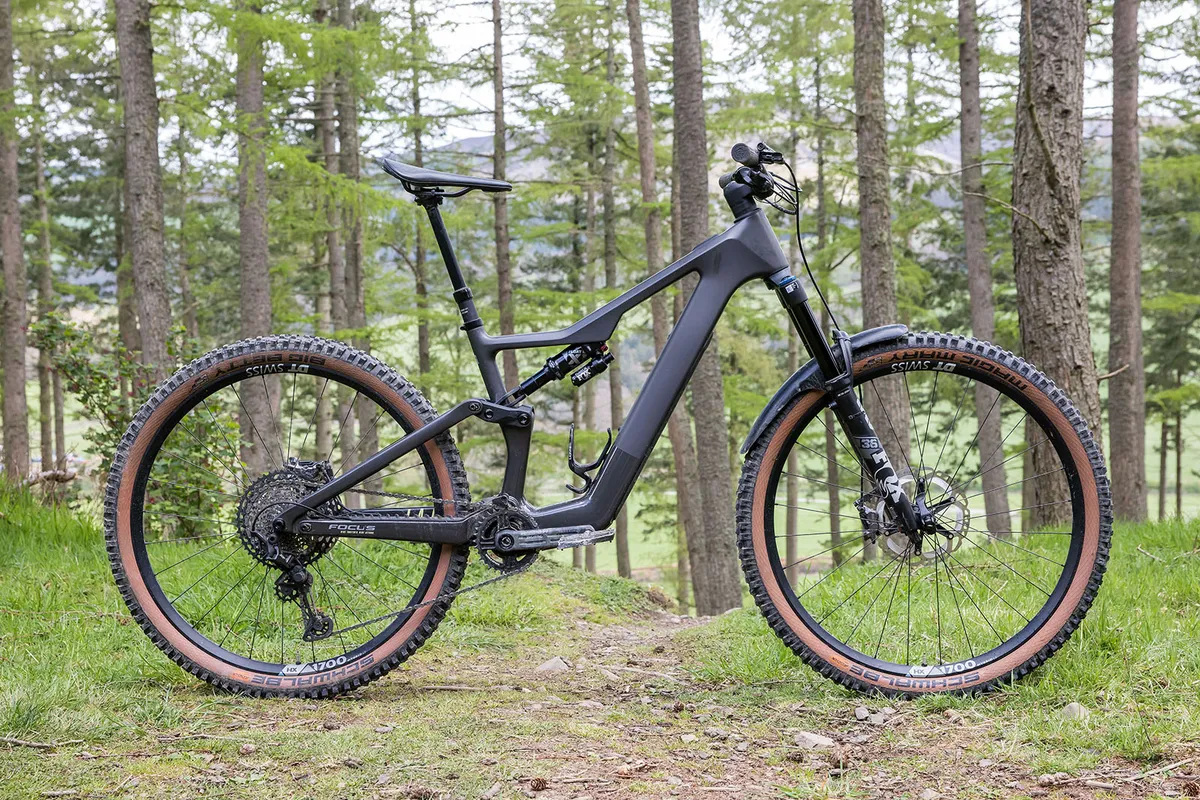
- £7,499 / €8,499 / AU$14,499 as tested
- Pros: Impeccable performance; powerful and frugal motor
- Cons: Stock tyres are inadequate; Fazua ring controller feels cheap
The Focus JAM2 SL 9.9 is the German brand's lightweight electric mountain bike. It uses Fazua's Ride 60 motor that gives the bike a perky 60Nm of torque combined with a frugal power consumption of the 430Wh battery.
Focus has given the JAM2 two geometry flip chips, allowing the bike to be set up longer, lower and slacker thanks to their position in the linkage and chainstay. We found this allows the bike to span both the trail and enduro categories, making the bike seriously fun on a variety of trails.
The only letdown from the spec was the lightweight tyres, although this is easily corrected.
- Read more: Focus JAM2 SL 9.9 review
SQUIRREL_13140202
Marin Alpine Trail E2
SQUIRREL_TEXT_13119149
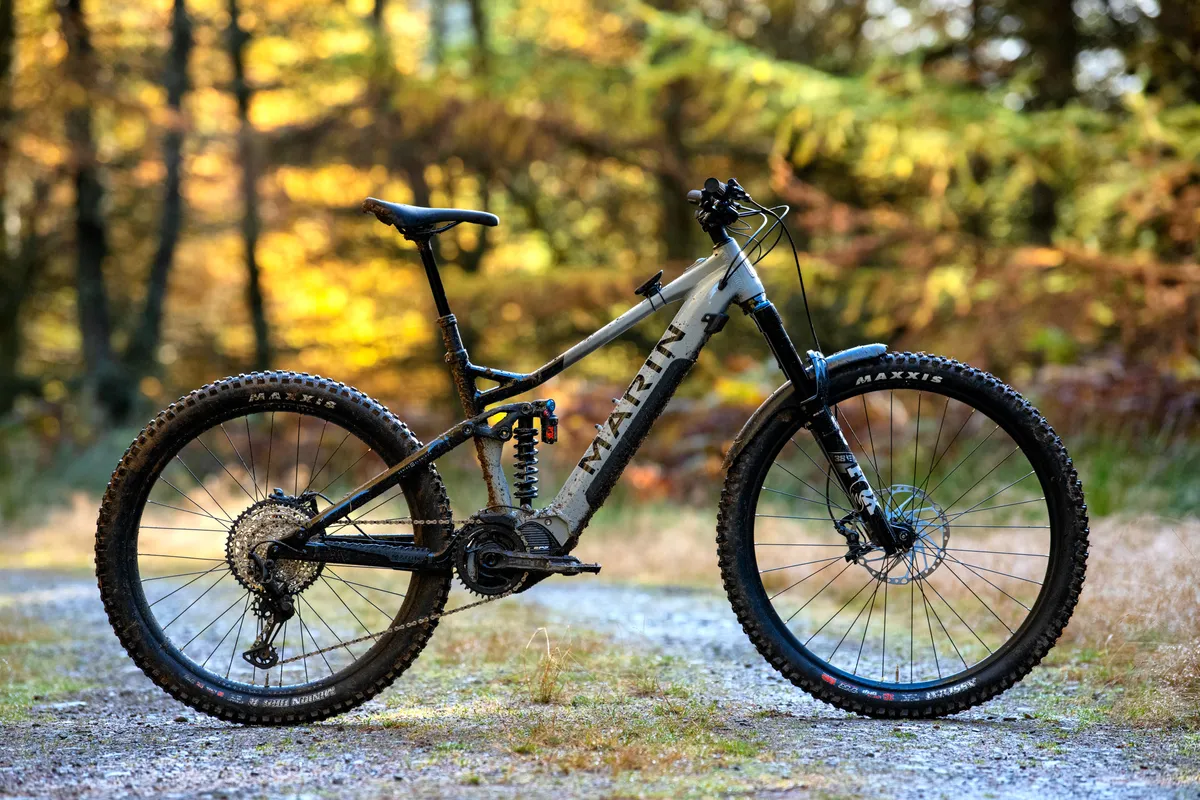
- £5,695 / $5,999 / €6,199 as tested
- Pros: Capable; fun and comfortable
- Cons: Cluttered handlebar; rear tyre not suited to some terrain
Marin launched the Alpine Trail E at the end of 2020 and at the time it was the Californian brand's first full-suspension electric mountain bike.
Luckily, it was worth the wait because the Alpine Trail E is a capable, fun and comfortable e-MTB with a well-thought-out spec that offers good value for money including top-spec dampers, Shimano drivetrains and branded components.
You get an aluminium frame with 150mm of travel, with aggressive, descent-focused geometry, while Shimano's EP8 motor provides the power.
The Alpine Trail E2 is at home on a broad spectrum of trails and lives up to Marin's promise as a bike that will put a smile on your face.
The range also includes the cheaper Alpine Trail E1 at £4,295 / $4,499 / €4,899.
- Read more: Marin Alpine Trail E2 review
SQUIRREL_13119149
Orbea Rise LT M-Team

- £8,943 as tested
- Pros: Well-balanced geometry; supportive suspension; responds well to hard riding
- Cons: Quite harsh; mid-size hits could be absorbed better
The Rise LT M-Team is Orbea's range-topping lightweight electric bike, featuring a drool-worthy spec and flashing plenty of Fox Kashima. This LT (Long Travel) model has 150mm of rear-wheel travel matched to a 160mm Fox 36 Factory fork.
Shimano’s latest EP-801 motor moves the bike well, offering 85Nm of torque and is mated to a 420Wh battery, although you can spec a 630Wh unit.
We found the suspension to offer plenty of support, although the bike didn't seem as forgiving as others we've tested, with mid-size hits not being absorbed very well. However, we like the bike's handling, with its fast and agile character making for playful descending whatever the gradient.
- Read more: Orbea Rise LT M-Team review
SQUIRREL_13079794
Propain Ekano 2 CF Ultimate

- £8,600 / $9,999 / €9,999 as tested
- Pros: Well thought-out geometry; Powertrain integration; excellent geometry and handling
- Cons: Auto Shift SRAM gears won't please everyone; battery life isn't the best
The Propain Ekano 2 CF Ultimate is nearly flawless: it has generous suspension, well-designed geometry that makes for thrilling yet controlled handling, and the build is pleasingly premium.
In turns and technical sectors, and on ascents and descents, the Ekano 2 is a hoot to ride.
The SRAM Eagle Powertrain electric bike motor is a standout performer. Auto Shift won’t be everyone’s cup of tea, but the seamless integration of the controls, shifting, dropper post and motor probably will be.
- Read more: Propain Ekano 2 CF Ultimate review
Specialized S-Works Turbo Levo 4

- £12,499 / $13,499 / €14,499 as tested
- Pros: Well-balanced suspension; worthwhile geometry adjustment; smooth power delivery
- Cons: Pricey
Specialized's S-Works Turbo Levo 4 is the flagship model in the Turbo Levo range and features the brand's most powerful motor yet, with 111Nm of torque and 720W of peak power.
We found the bike offered plenty of grunt for technical climbing, with power delivery smooth throughout various cadences.
On descents, the bike feels incredibly balanced, giving the bike the calmness of a much burlier beast.
It comes at a cost though, and the impressive motor details are only available on the S-Works model.
- Read more: Specialized S-Works Turbo Levo 4 review
Whyte E-Lyte 150 Works
SQUIRREL_TEXT_13120628

- £9,999 as tested
- Pros: Fantastic downhill and good uphill; decent weight; long-lasting battery
- Cons: Motor prefers high cadence; oversized chainring; fragile rear tyre
Winner of our Lightweight eMTB of the Year award, the Whyte E-Lyte 150 Works' perfectly poised ride enables it to master challenging trails.
When pushed to its limits downhill, few lightweight electric mountain bikes can challenge the E-Lyte 150 Works. Its geometry isn't excessively slack and the weight isn't too much for the Bosch Performance Line SX Motor, so you can get back uphill in relative comfort.
A smaller chainring than the 36t specced would further improve the ride, as would an alternative to the fragile rear tyre.
- Read more: Whyte E-Lyte 150 Works review
SQUIRREL_13120628
YT Decoy SN 29 Core 4

- £8,999 / $8,999 / €8,999 as tested
- Pros: Natural-feeling motor; feels good to jump; good value
- Cons: Controller ring feels flimsy; front end harsh
YT's Decoy SN 29 uses a Fazua Ride 60 motor, giving it up to 60Nm of torque and 450W of peak power, which it delivers in a natural-feeling way.
We found the Decoy SN 29 to have easy handling on the descents, without being a handful in the air over jumps.
In a world of £12,000 eMTBs, the Decoy SN 29 also provides good value, especially considering the spec supplied by YT.
We found the Fazua controller a little flimsy on the bar, and the front end felt harsh when plowing through jank.
- Read more: YT Decoy SN 29 Core 4 review
Canyon Neuron:ON AL 9

- £5,199 / €5,499 as tested
- Pros: Composed at speed; considered spec; SRAM S1000 Eagle AXS Transmission; good battery range
- Cons: Needs to be ridden hard in the corners, no head tube controller
The Neuron:ON AL has excellent geometry and suspension kinematics that make the bike stable at speed, although this takes away from the playfulness the previous generation had.
Canyon delivers an impressive spec, with Bosch's latest Performance Line CX motor sitting in the frame and SRAM's S1000 Eagle AXS Transmission making shifting a painless exercise.
For more experienced riders, there is good upgrade potential if you want to push the capability of the bike.
The bike needs to be ridden confidently through the corners, with the long, low and slack frame not as nimble as other bikes in the segment.
- Read more: Canyon Neuron:ON AL 9
Forestal Cyon Neon
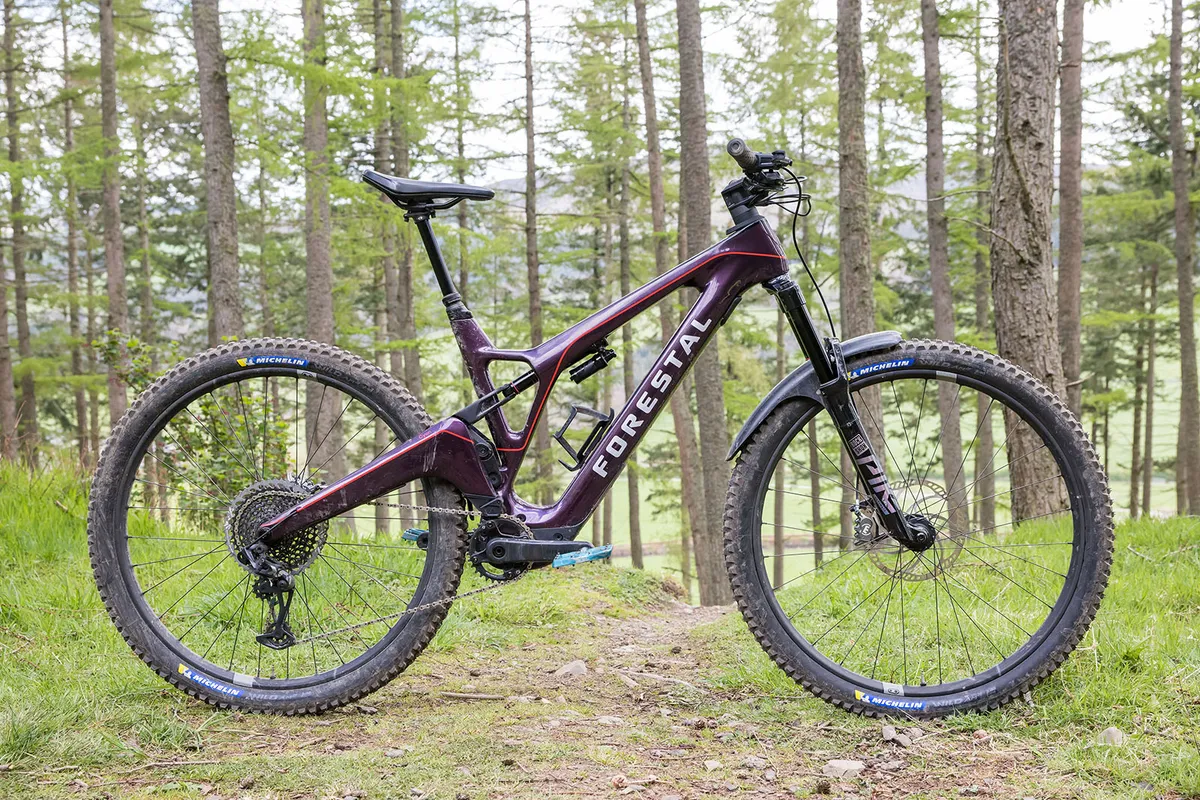
- £10,999 / $11,799 as tested
- Pros: Supportive suspension; balanced geometry
- Cons: Pike fork is under-gunned; stock tyres not suitable
Forestal's Cyon is a solid performer and does well to encapsulate everything a trail bike should be.
The Bafang-built EonDrive motor provides a punchy 60Nm of torque and 250Wh of nominal power which is provided by a 360Wh batter located in the downtube.
The bike's low sag recommendation makes the bike less comfy than others on rough, bumpy surfaces, but when pointed down a trail the bike feels muted and forgiving. However, we did find the RockShox Pike Ultimate to be a little under-gunned, being easily overwhelmed by the capability of the rear end.
- Read more: Forestal Cyon Neon review
Haibike Lyke CF 11
SQUIRREL_TEXT_13077189
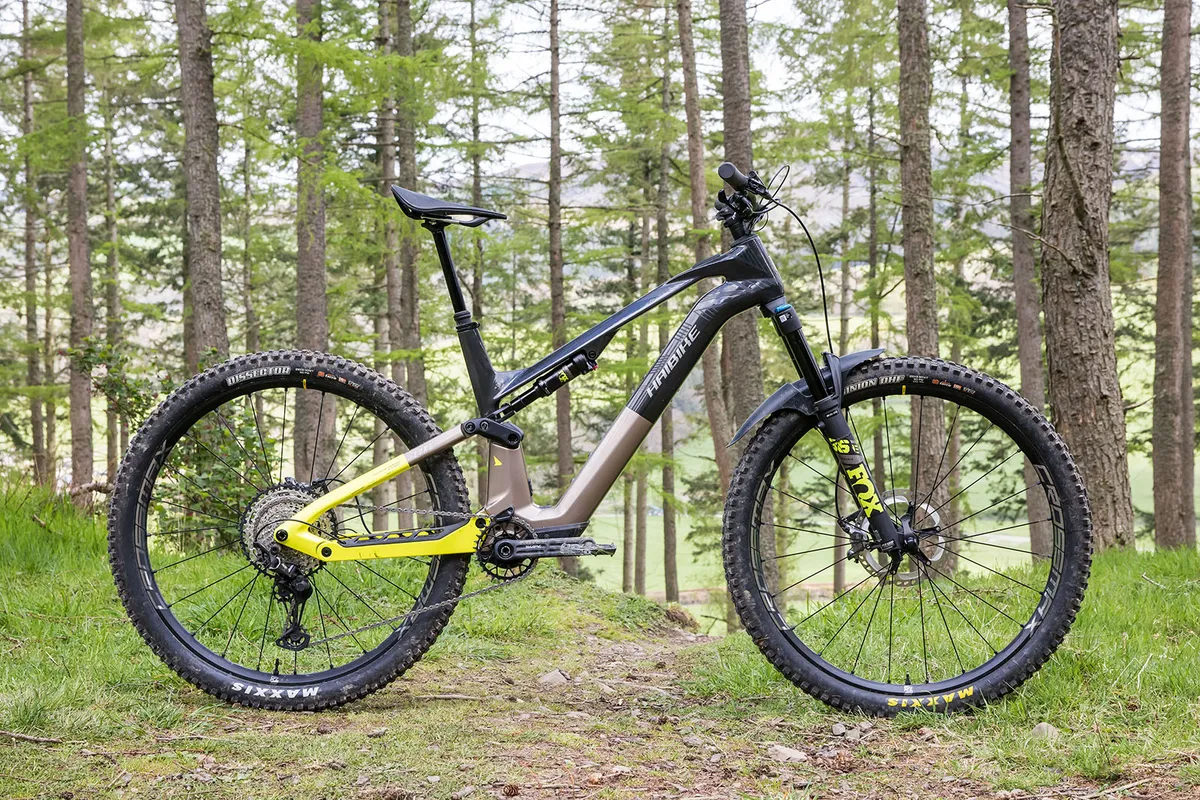
- £6,799 / €7,999 as tested
- Pros: Sorted suspension; value for money
- Cons: Unsuitable tyres; messy cable routing
The Haibike Lyke CF 11 provides plenty of support, both up and downhill, with the Fazua Ride 60 motor providing 60Nm of torque and up to 450Wh of power taken from a 430Wh battery located in the downtube of the carbon frame.
The bike punches above its 140mm of suspension travel, with the considered geometry able to provide more performance than expected.
Haibike provides a competitive spec, with a Shimano XT /SLX hybrid groupset, Fox 36 Performance forks and Fox Float DPS Performance shock helping to make this bike seriously good value for money.
- Read more: Haibike Lyke CF 11 review
SQUIRREL_13077189
Marin Alpine Trail E2 Bosch
SQUIRREL_TEXT_13192171

- £6,385 / $6,599 / €7,249 as tested
- Pros: Powerful and frugal Bosch motor; great climbing position; value for money; balanced, adjustable geometry; sensibly specced
- Cons: Hefty, limiting performance
The Marin Alpine Trail E2 Bosch is the brand's first to eMTB to feature a Bosch motor and the Horst-link-derived MultiTrac 2 LT suspension platform. Combined with the large Bosch battery, DH-ready spec and Series 4 aluminium frame, it comes in at a hefty 27.55kg.
The eMTB's weight, weight, geometry and suspension combine to create a planted and immovable feel, sticking lines impressively.
However, lighter riders might struggle to tame it once things go wrong, and weight-saving upgrades unlock a more playful character.
- Read more: Marin Alpine Trail E2 Bosch review
SQUIRREL_13192171
Scott Lumen eRide 910
SQUIRREL_TEXT_13077188
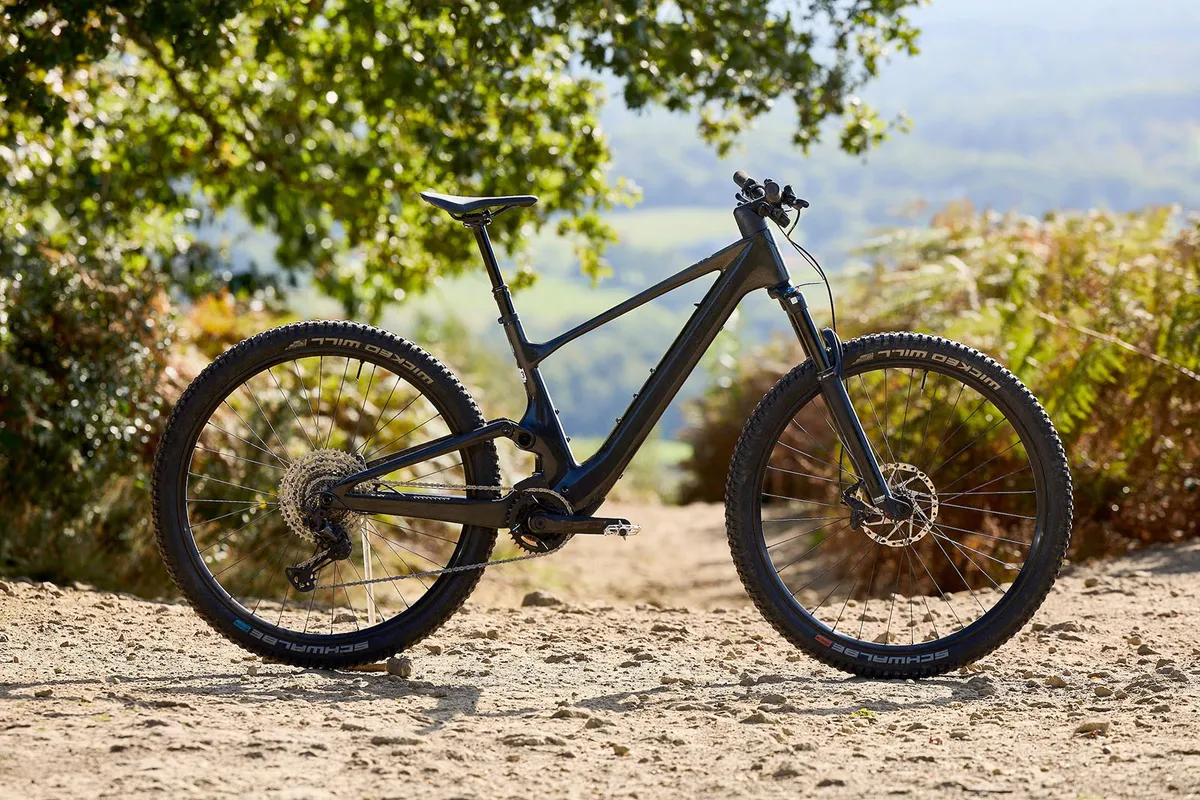
- £6,499 / $6,999 / €7,000 as tested
- Pros: Rear suspension is capable up and downhill; motor provides fun and efficient climbing; well-integrated design
- Cons: Tyres limit descending potential; internal shock can be fiddly to adjust
Scott's Lumen eRide 910 offers realistic trail bike ability on the descents, while the frame and motor provide fun and engaging climbing characteristics.
The bike is set up to maximise trail speed, with it feeling as though Scott has dialled back on more adventurous spec choices.
Schwalbe's Wicked Will tyres may lighten the overall weight of the bike, but we found it limiting when coming down gnarlier trails.
- Read more: Scott Lumen eRide 910 review
SQUIRREL_13077188
YT Decoy MX Core 5

- £7,999 / $8,499 / €7,999 as tested
- Pros: Brilliant descending; top value; long battery life
- Cons: Slack seat tube angle impairs climbing; occasional chain jamming
The YT Decoy MX Core 5 will delight downhill demons by providing stacks of traction and predictability on testing descents. It does so at a competitive price too.
But the Decoy MX Core 5’s slack seat tube angle feels less conducive to climbing, especially when the ascents get technical.
Shimano’s Di2 HG+ shifting usually chooses the right gear automatically, but doesn’t quite match SRAM Transmission’s precision.
- Read more: YT Decoy MX Core 5 review
Also consider...
These bikes scored fewer than 4 out of 5 stars in our reviews but are still worth considering.
Commencal Meta Power SX Bosch Signature

- $8,000 / €8,800 as tested
- Pros: Composed geometry; impressive climbing performance; rewards aggressive riding
- Cons: Stock tyres pick up punctures; suspension is not the smoothest; not great for chilled laps
The Meta Power SX Bosch Signature features 165mm of rear-wheel travel, although our tester found the bike rode as if it had less than this, lacking the trail-isolating comfort of a long-travel bike.
Despite this, the bike offers a sportier feel than most, with aggressive riding seeing plenty of speed generated down the trail.
We found the bike to climb well, with the Bosch Performance Line CX motor providing plenty of punch for technical ascents.
Scott Patron 900 eMTB

- £8,099 / $8,799 as tested
- Pros: Impressive uphill performance; sleek integration; sensible spec
- Cons: ABS benefits questionable; geometry needs tweaking; stock tyres need replacing
Scott's Patron 900 eMTB performs well on mild trails, with an easy-riding, fun-loving character on the majority of trails.
Unfortunately, its conservative geometry holds it back on gnarlier trails, where it's easy to overwhelm the front of the bike on steep sections.
Despite its respectable 24kg weight, the Patron feels monstrous on tough singletrack, with a lot of effort needed to keep it in line.
We also failed to see the benefit of the Bosch ABS Pro brakes, with the system seeming to reduce braking ability.
- Read more: Scott Patron 900 eMTB review
How we test electric mountain bikes

We test electric mountain bikes where they belong, out on the trails and taking in plenty of elevation.
Not all eMTBs are designed for the same type of riding, so we consider this when testing but still push the capability of each model on extreme trails.
Our team has tested hundreds of electric mountain bikes over the years, so we understand what separates the good from the bad.
We go out in varying conditions and on a mix of trails to see how the bikes perform in a general sense as well as on the trails they're designed for.
Ultimately, our electric mountain bike reviews are based on the following criteria:
- Handling characteristics – how does the bike handle down the trail and does it hide its weight well in tight corners?
- Specification – does the bike come with good components that can stand up to the added wear and tear of eMTBing?
- Value vs the competition – how does the bike stack up compared to others in the market? Are you getting a good deal?
- Subjective reflections – our testing always aims to be objective, but we also recognise that some features and characteristics will suit individuals differently. We aim to reflect these in our reviews, giving you the information you need to make the best buying decision.
Why you can trust BikeRadar
BikeRadar has been an authority on bikes and cycling tech since its inception in 2007, delivering the world’s best riding advice.
We have experts testing all types of bikes, parts, clothing and accessories, from road, mountain and gravel bikes to commuting, bikepacking and electric bikes.
Our reviews are always editorially independent – with no exceptions. Our reviewers comprehensively test all products in the real world, always reflecting on performance, value and the wider market when delivering their verdicts and review ratings.
We have more than 15,000 product reviews available at your fingertips, as well as expert buying, maintenance, training, skills, health and fitness advice.
Our annual Bike of the Year test is an industry benchmark and the BikeRadar team consists of some of the most experienced riders and testers in the business.
Buyer’s guide to electric mountain bikes
Electric mountain bike types
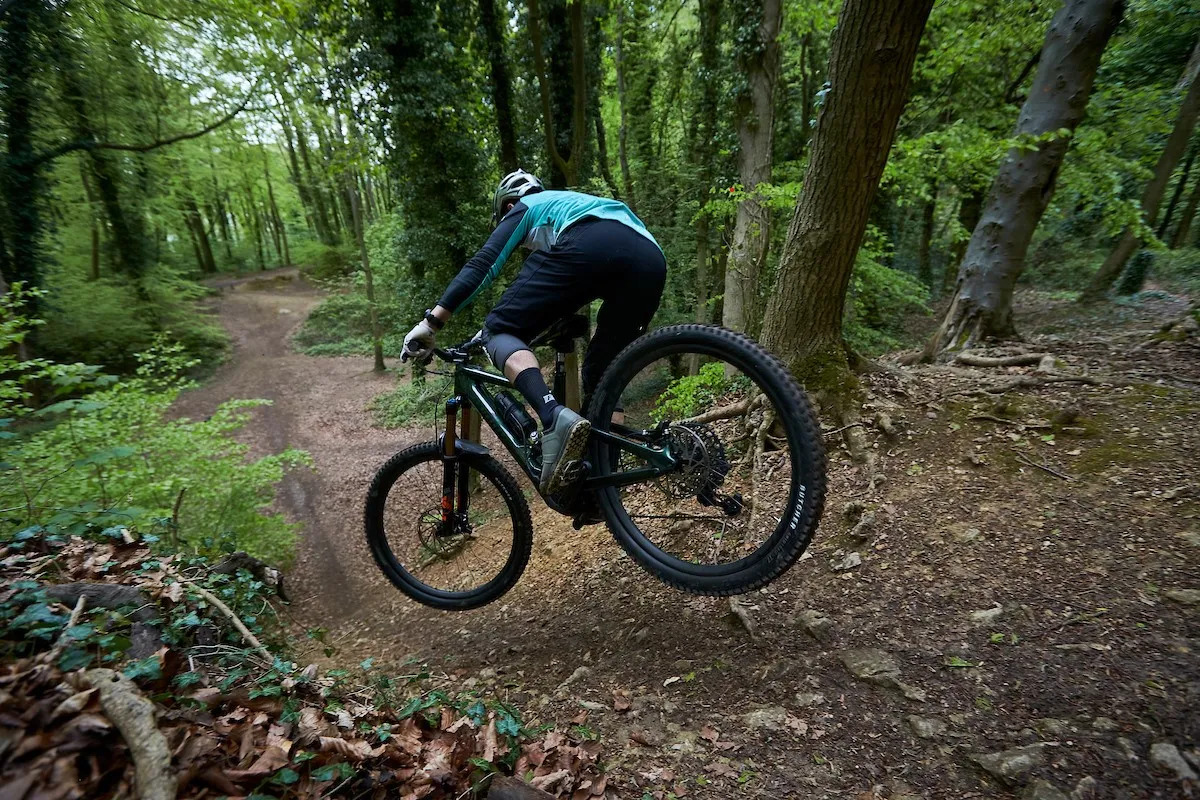
Whereas first-generation eMTBs tended to be trail-oriented with around 150mm of travel, there’s now an increasing range of mountain bike disciplines covered.
That includes overbuilt models designed for downhill use at one end of the spectrum, including the Specialized Turbo Kenevo and the Cannondale Moterra Neo.
At the other end, there are lightweight electric mountain bikes, such as the Specialized Turbo Levo SL and the Lapierre eZesty. These use lighter, less powerful motors and smaller batteries similar to electric road bikes. That drops the bike’s weight and ups agility over more heavily built machines.
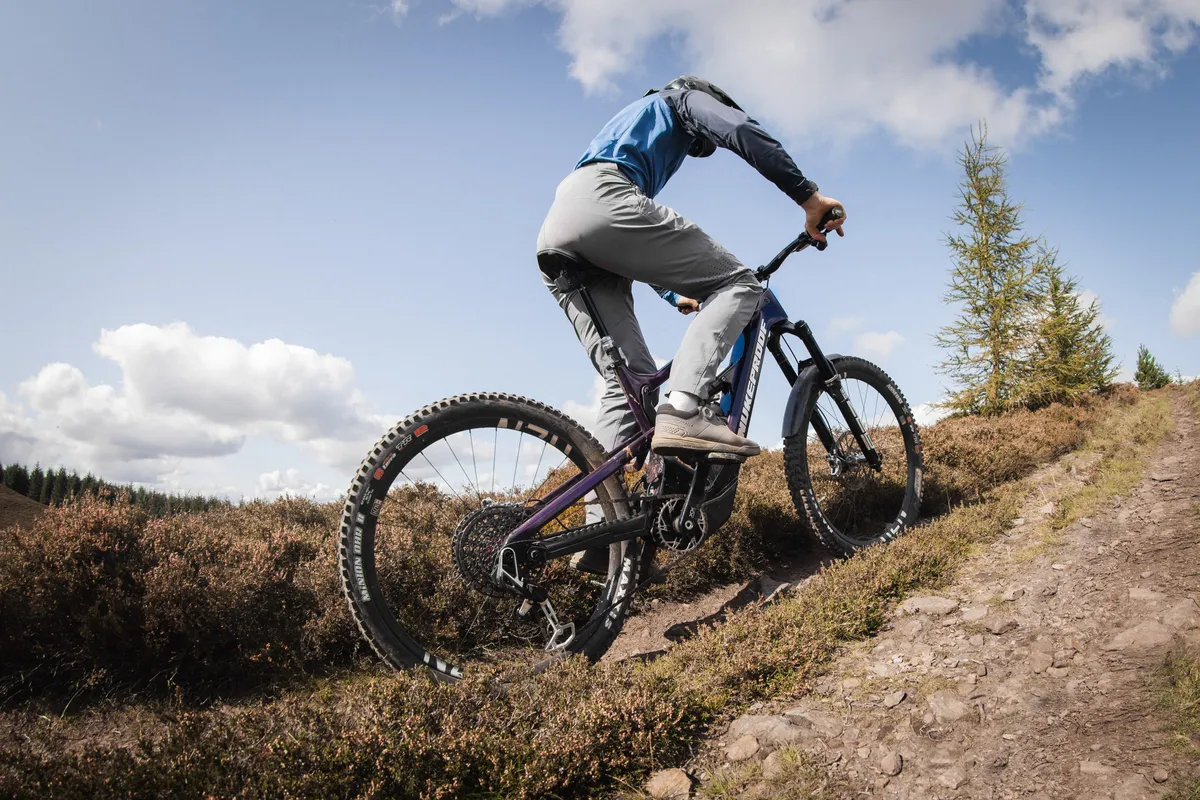
You’ll find eMTBs with either 29in or 27.5in wheels, but ‘mullet builds’ with a 29in wheel up front and a 27.5in rear are becoming increasingly common. This setup gives good stability at the front and better agility from the smaller rear wheel. Examples include the Canyon Spectral:ON.
Most eMTBs are full-suspension bikes, but you can also find trail-oriented electric hardtails, such as the Canyon Grand Canyon:ON and Kinesis Rise.
Electric mountain bike motors
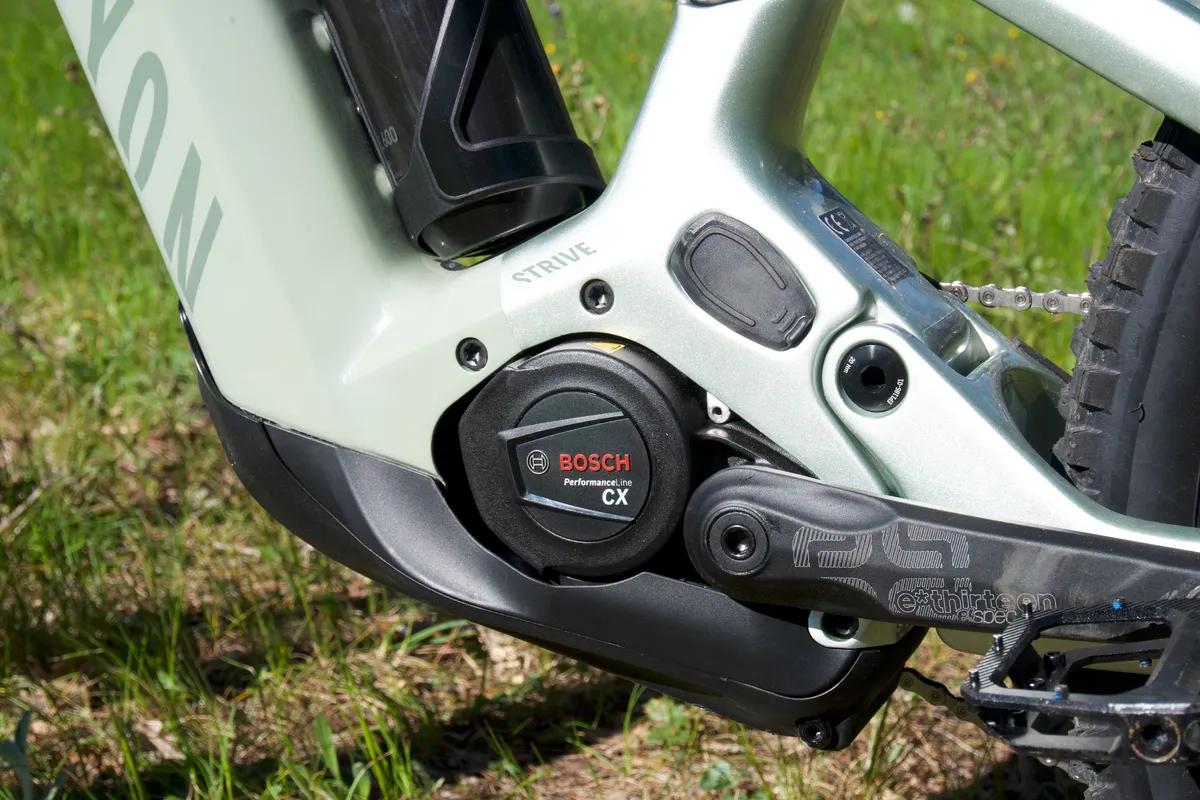
Popular choices for electric mountain bike motors are Bosch, Shimano Steps and Yamaha, while Fazua’s lightweight motor is increasingly making an appearance on weight-focused bikes.
The Bosch Performance Line CX motor has been updated this year but continues to have a 600Wh peak power output and 85Nm of torque for fuss-free climbing. There’s a natural ride feel and good battery management that gets impressive range out of the system’s battery.
Shimano’s Steps E-8000 and E-7000 systems are still found on some eMTBs, although they've started to show their age, with lower power output and torque than newer rivals. Its smaller batteries give you less range too, but still boast low weight and a compact design, along with the ability to tune the output.
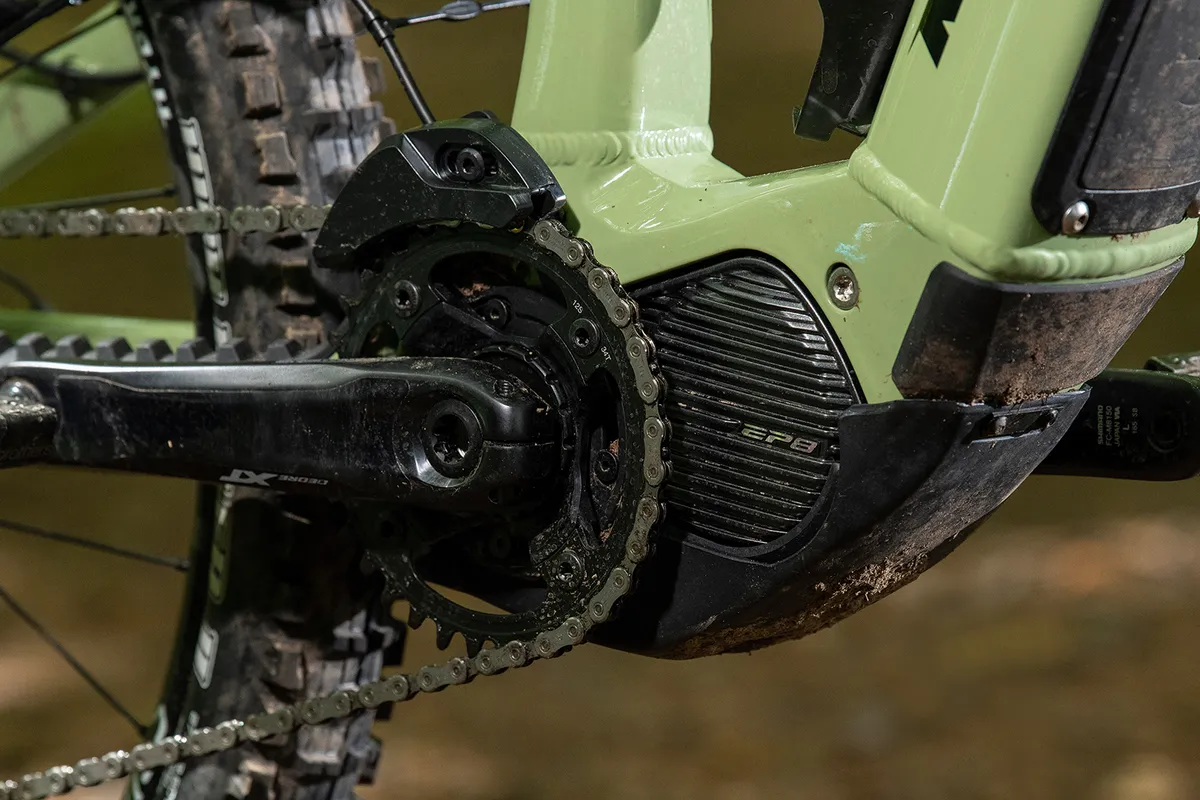
However, Shimano has added the EP8 motor to its range. This boosts torque to 85Nm while reducing weight by around 200g, lowering pedalling drag, increasing range and lowering Q-Factor. The EP8's launch coincided with Shimano increasing battery capacity to 630Wh. More and more, you'll find it being specced on newer electric mountain bikes, including many of our picks above of the best electric mountain bikes.
Meanwhile, Giant uses the Yamaha Syncdrive Pro motor on its e-MTBs. Its Smart Assist mode uses an array of six sensors, including a gradient sensor, to work out how much power to deliver in any given situation.
A popular choice on road-going ebikes, the Fazua and TQ motor systems are found on some lighter-weight e-MTBs, such as the Lapierre eZesty. It’s lighter, less powerful and has a smaller battery. That means you typically need to put in more of your own pedalling effort, but it drops the bike’s weight down closer to non-assisted models. Plus, you can remove the battery completely and ride the bike without it.
Specialized has its own motor units, which it specs on the majority of its electric bikes. Its Turbo Levo SL trail bike uses the low-torque SL 1.1 motor and a 320Wh battery for less assistance and lighter weight.
SRAM has also joined the mix with it's Eagle Powertrain drive system which uses a similar Brose motor to that found in Specialized's system.
Eagle Powertrain has a wide range of connectivity features to the brand's Eagle AXS Transmission with Coast Shift allowing gears to be selected while not pedalling.
Electric mountain bike battery capacity
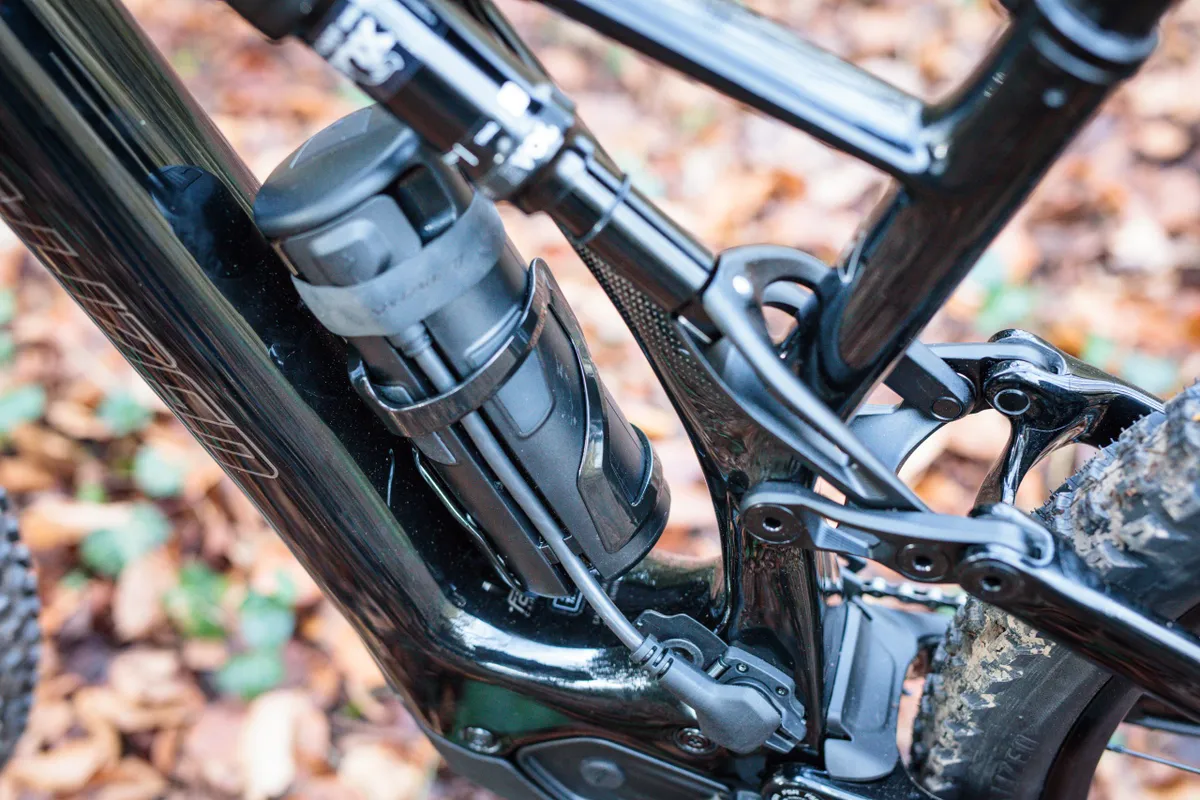
To get you up hills, produce enough power and provide adequate range, most electric mountain bikes will have battery capacities of around 500Wh to 700Wh.
An internal battery in the down tube makes for clean lines, but there are also e-MTBs with external batteries. These typically lower the weight and, in models such as the Lapierre Overvolt, mean the battery can be placed lower and more centrally.
But, as mentioned above, eMTBs with smaller-capacity ebike batteries down to 250Wh are appearing. These trade a more limited range for lighter weight and the potential for improved handling.
